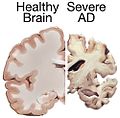Alzheimer's disease: Difference between revisions
No edit summary |
CSV import |
||
| Line 51: | Line 51: | ||
[[Category:Neurological disorders]] | [[Category:Neurological disorders]] | ||
[[Category:Neurodegenerative diseases]] | [[Category:Neurodegenerative diseases]] | ||
<gallery> | |||
File:Brain-ALZH.png|Alzheimer's disease | |||
File:Alzheimer’s_Disease,_Spreads_through_the_Brain_(24524716351).jpg|Alzheimer's disease | |||
File:Alzheimers_brain.jpg|Alzheimer's disease | |||
File:Alzheimers_Disease.jpg|Alzheimer's disease | |||
File:Histopathology_of_Alzheimer's_disease.jpg|Alzheimer's disease | |||
File:PET_Alzheimer.jpg|Alzheimer's disease | |||
File:InterlockingPentagons.svg|Alzheimer's disease | |||
File:Honoré_Daumier_032.jpg|Alzheimer's disease | |||
File:Donepezil_1EVE.png|Alzheimer's disease | |||
File:Memantine.svg|Alzheimer's disease | |||
File:Alzheimer's_disease_and_other_dementias_world_map-Deaths_per_million_persons-WHO2012.svg|Alzheimer's disease | |||
File:Auguste_D_aus_Marktbreit.jpg|Alzheimer's disease | |||
</gallery> | |||
Revision as of 12:18, 18 February 2025
Alzheimer's disease (AD) is a neurodegenerative disease characterized by progressive cognitive deterioration, declining activities of daily living, and neuropsychiatric symptoms or behavioral changes. It is the most common cause of dementia. The most striking early symptom is memory loss (amnesia), which usually manifests as minor forgetfulness that becomes more pronounced with illness progression, with relative preservation of older memories.
| Videos |
|---|
| Aging & Alzheimer's Disease, Part 1
Related Videos Aging & Alzheimer's Disease, Part 2 |
Symptoms and signs
As Alzheimer's disease progresses, cognitive impairment extends to various domains:
Language (aphasia) Skilled movements (apraxia) Recognition (agnosia) Decision-making and planning, which are closely related to the frontal and temporal lobes of the brain as they become disconnected from the limbic system
Pathophysiology
The underlying pathological process in Alzheimer's disease consists mainly of neuronal loss or atrophy, accompanied by an inflammatory response to the deposition of amyloid plaques and neurofibrillary tangles.
Genetics
Genetic factors play a significant role in Alzheimer's disease. Autosomal dominant mutations in three different genes (presenilin 1, presenilin 2, and amyloid precursor protein) have been identified, accounting for a small number of cases of familial, early-onset AD. For late-onset AD (LOAD), only one susceptibility gene has been identified: the epsilon 4 allele of the apolipoprotein E gene. The age of onset itself has a heritability of around 50%.
Diagnosis
Diagnosis of Alzheimer's disease is typically based on a combination of medical history, physical examination, cognitive assessments, and imaging studies such as MRI and PET scans. Biomarker tests can also be used to support a diagnosis, but these are not yet widely available or validated for routine clinical use.
Treatment
Currently, there is no cure for Alzheimer's disease. Treatment focuses on managing symptoms and improving the quality of life for affected individuals. Medications such as cholinesterase inhibitors and memantine may help to alleviate cognitive symptoms. Supportive therapies, including occupational, physical, and speech therapy, can help maintain daily functioning and communication skills. Lifestyle modifications, such as regular exercise, a balanced diet, and adequate sleep, can help improve overall health and well-being.
Prognosis
Alzheimer's disease is a progressive disorder, with affected individuals experiencing a gradual decline in cognitive and functional abilities. The course of the disease can vary, with some people experiencing a more rapid progression than others. The average life expectancy after the onset of symptoms is approximately 8 to 10 years.
See also
- Dementia
- Lewy body dementia
- Parkinson's disease
- Neurodegenerative diseases
- Familial Alzheimer disease
- Dementia with Lewy bodies
- Frontotemporal lobar degeneration
- Corticobasal degeneration
- Memory and aging
- Memory loss
- Memory
|
|
|
| Diseases of the nervous system, primarily CNS (G04–G47, 323–349) | ||||||||||||||||||||
|---|---|---|---|---|---|---|---|---|---|---|---|---|---|---|---|---|---|---|---|---|
|
| Amyloidosis | ||||||
|---|---|---|---|---|---|---|
|
-
Alzheimer's disease
-
Alzheimer's disease
-
Alzheimer's disease
-
Alzheimer's disease
-
Alzheimer's disease
-
Alzheimer's disease
-
Alzheimer's disease
-
Alzheimer's disease
-
Alzheimer's disease
-
Alzheimer's disease
-
Alzheimer's disease
-
Alzheimer's disease













